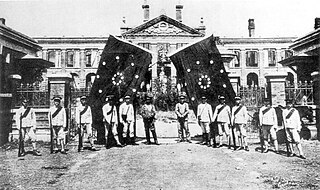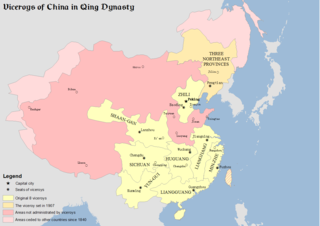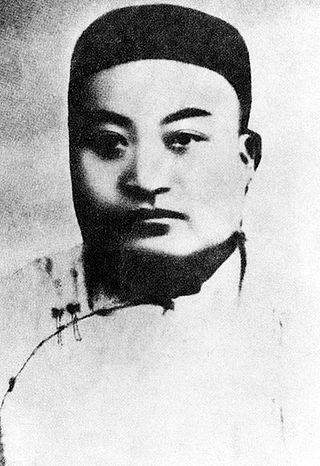This article needs additional citations for verification .(October 2018) |
| |||||
| Decades: | |||||
|---|---|---|---|---|---|
| See also: | Other events of 1904 History of China • Timeline • Years | ||||
The following lists events that happened during 1904 in China .
This article needs additional citations for verification .(October 2018) |
| |||||
| Decades: | |||||
|---|---|---|---|---|---|
| See also: | Other events of 1904 History of China • Timeline • Years | ||||
The following lists events that happened during 1904 in China .

Yuan Shikai was a Chinese general and statesman who served as the second provisional president of the Republic of China, head of the Beiyang government from 1912 to 1916 and Emperor of China from 1915 to 1916. A major political figure during the late Qing dynasty, he spearheaded a number of major modernisation programs and reforms and played a decisive role in securing the abdication of the Xuantong Emperor in 1912, which marked the collapse of the Qing monarchy and the end of imperial rule in China.

The Wuchang Uprising was an armed rebellion against the ruling Qing dynasty that took place in Wuchang, Hubei, China on 10 October 1911, beginning the Xinhai Revolution that successfully overthrew China's last imperial dynasty. It was led by elements of the New Army, influenced by revolutionary ideas from Tongmenghui. The uprising and the eventual revolution directly led to the downfall of the Qing dynasty with almost three centuries of imperial rule, and the establishment of the Republic of China (ROC), which commemorates the anniversary of the uprising's starting date of 10 October as the National Day of the Republic of China.

The 1911 Revolution, also known as the Xinhai Revolution or Hsinhai Revolution, ended China's last imperial dynasty, the Qing dynasty, and led to the establishment of the Republic of China. The revolution was the culmination of a decade of agitation, revolts, and uprisings. Its success marked the collapse of the Chinese monarchy, the end of 2,132 years of imperial rule in China and 276 years of the Qing dynasty, and the beginning of China's early republican era.

Huang Xing or Huang Hsing was a Chinese revolutionary leader and politician, and the first commander-in-chief of the Republic of China. As one of the founders of the Kuomintang (KMT) and the Republic of China, his position was second only to Sun Yat-sen. Together they were known as Sun-Huang during the Xinhai Revolution. He was also known as the "Eight Fingered General" because of wounds sustained during war. His tomb is on Mount Yuelu, in Changsha, Hunan, China.

Kang Youwei was a prominent political thinker and reformer in China of the late Qing dynasty. His increasing closeness to and influence over the young Guangxu Emperor sparked conflict between the emperor and his adoptive mother, the regent Empress Dowager Cixi. His ideas were influential in the abortive Hundred Days' Reform. Following the coup by Cixi that ended the reform, Kang was forced to flee. He continued to advocate for a Chinese constitutional monarchy after the founding of the Republic of China.

Liang Qichao was a Chinese politician, social and political activist, journalist, and intellectual. His thought had a significant influence on the political reformation of modern China. He inspired Chinese scholars and activists with his writings and reform movements. His translations of Western and Japanese books into Chinese further introduced new theories and ideas and inspired young activists.

Zongdu were the managers supervising provincial governors in Ming and Qing China. One viceroy usually administered several provinces and was in charge of all affairs of military, food, wages, rivers, and provincial governors within their region of jurisdiction. Viceroys was appointed by and directly reported to the Emperor.

Zhang Zhidong was a Chinese politician who lived during the late Qing dynasty. Along with Zeng Guofan, Li Hongzhang and Zuo Zongtang, Zhang Zhidong was one of the four most famous officials of the late Qing dynasty. Known for advocating controlled reform and modernization of Chinese troops, he served as the governor of Shanxi Province and viceroy of Huguang, Liangguang and Liangjiang, and also as a member of the Grand Council. He took a leading role in the abolition of the Imperial examination system in 1905. The Red Guards destroyed his tomb in 1966 during the Cultural Revolution. His remains were rediscovered in 2007 and reburied.

Cai E (simplified Chinese: 蔡锷; traditional Chinese: 蔡鍔; pinyin: Cài È; Wade–Giles: Ts'ai4 O4; 18 December 1882 – 8 November 1916) was a Chinese revolutionary leader and general. He was born Cai Genyin (Chinese: 蔡艮寅; pinyin: Cài Gěnyín) in Shaoyang, Hunan, and his courtesy name was Songpo (Chinese: 松坡; pinyin: Sōngpō). Cai eventually became an influential warlord in Yunnan (Yunnan clique), and is best known for his role in challenging the imperial ambitions (Hongxian emperor) of Yuan Shikai during the Anti-Monarchy War.

Cen Chunxuan, courtesy name Yunjie, was a Zhuang Chinese politician who lived in the late Qing dynasty and Republic of China.

Gao Xu, was a Chinese poet, writer, revolutionary, political activist. Gao is one of the three founders of the South Society which was the largest organization of literature and poetry during the late Qing dynasty China and the early period of the Republic of China. Gao is also one of the founding members of Tongmenghui led by Sun Yat-sen.

Towards the Republic, also known as For the Sake of the Republic and Zou Xiang Gong He, is a Chinese historical television series first broadcast on China Central Television (CCTV) in China from April to May 2003. The series is based on events which occurred in China in the late 19th century and early 20th century, and led to the collapse of the Qing dynasty and the founding of the Republic of China. Because the series portrayed historical issues to which the current Chinese government remains politically sensitive, the series has been subjected to censorship in mainland China.

Tang Caichang was a late Qing dynasty revolutionary and political activist. He and fellow reformer Tan Sitong were from Liuyang. Tang was chosen by Kang Youwei to lead an uprising in Hankou, however he and thirty others were arrested by Qing forces before it ever began on August 21, 1900. By order of Zhang Zhidong, then Viceroy of Huguang, he was beheaded the following day in Wuchang. He is considered by the Chinese to be a martyr for revolution.

The Mutual Defense Pact of the Southeastern Provinces was an agreement reached in the summer of 1900 during the Boxer Rebellion by Qing dynasty governors of the provinces in southern, eastern and central China when the Eight-Nation Alliance invaded northern China. The governors, including Li Hongzhang, Xu Yingkui, Liu Kunyi, Zhang Zhidong and Yuan Shikai, refused to carry out the imperial decree promulgated by the Qing imperial court to declare war on 11 foreign states, with the aim of preserving peace in their own provinces.
Events from the year 1898 in China (戊戌).

The Baise Uprising was a short-lived uprising organized by the Chinese Communist Party (CCP) in northwestern Guangxi around the city of Baise. It officially began on December 11, 1929, and lasted until late 1931. The uprising established the Seventh Red Army and a soviet over a number of counties in the You River valley. It drew support from a pre-existing movement of Zhuang peasants led by Wei Baqun, and focused on land redistribution in the area it controlled. After a brief but costly attempt to capture Guangxi's major cities, the soviet was suppressed and surviving soldiers made their way to Jiangxi. Today, it is most famous for the role played by Deng Xiaoping, who was the CCP Central Committee's leading representative in Guangxi during the Uprising. Deng was strongly criticized, both during the Cultural Revolution and by modern historians, for the uprising's swift defeat and his decision to abandon the retreating Seventh Red Army.

The Chinese Empire Reform Association, or Baohuang Hui in short, was an organization formed in Victoria, British Columbia and active mostly outside of China that intended to support Guangxu’s return to power in the Chinese Empire, which had been taken in a coup by Empress Dowager Cixi. It was formed in Victoria, British Columbia - where its named building still stands - on 20 July 1899 by Kang Youwei who had fled China to escape the death penalty. At its peak the association had chapters in 150 cities worldwide.
Events in the year 1888 in China.
Events from the year 1905 in China.

Xiliang was a Chinese official of Mongol heritage who served as the Viceroy of several provinces during the late Qing Dynasty. Xiliang was a Qing loyalist who supported moderate reforms and strongly opposed Western imperialism in China. He enthusiastically supported the Self-Strengthening Movement and the New Policies, but he opposed the spread of European culture and was sympathetic to the Boxer Rebellion. His efforts at reform saw mixed results. While generally praised by his superiors, Xiliang was also hampered by opposing factions in the Imperial Court and intervention by Western powers. His provincial administrations occasionally provoked popular unrest and accusations of corruption. During the final years of the Qing, Xiliang became an advocate of constitutional government. He ultimately failed to change Imperial policy in time to prevent the 1911 Revolution and retired from public life after the dynasty fell.